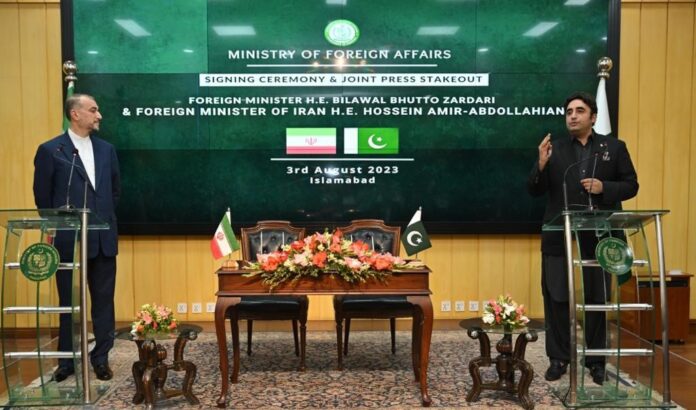Pakistan and Iran have agreed to activate remaining five border markets by the end of this year. Both nations pledged to combat Islamophobia, advance peace and stability in Afghanistan, and promote the welfare of the Afghans. Both countries also decided to repatriate all fishermen detained in each other country, waive fines imposed on them, and release their fishing boats. Foreign Minister Bilawal Bhutto Zardari, addressing a joint press conference with his Iranian counterpart Hossein Amir Abdollahian, emphasized the complete agreement between Pakistan and Iran on matters of mutual interest, recognizing that prosperity and development are interconnected with peace and stability in the neighborhood and the region.
The bilateral relations between Pakistan and Islamic Republic of Iran has improved significantly over the past months while this positive momentum was further augmented by the recent reunion between Riyadh and Tehran that was a major hurdle in the promotion of Pak-Iran tie up. There had been frequent high-level contacts and exchanges of the top-level delegations between Tehran and Islamabad aimed at strengthening bilateral ties, boosting trade and economic cooperation and achieving mutually beneficial shared objectives of the two neighborly nations. During the recent visit of the Foreign Minister of Iran, both countries signed various agreements including the protocols of bilateral economic consultation, and formation of the joint investment committee (JIC) along with a five-year trade cooperation plan to boost bilateral trade between Pakistan and Iran during the next five years from 2023-2028. Both governments also agreed to waive fines and release detained ship and fishermen of each other nation. Meanwhile, Afghanistan was an important topic of discussions during Hossein Amir Abdollahian interaction with Pakistani authorities, because, both nations have common borders with Afghanistan, host millions of Afghan refugees and have a consensus viewpoint regarding the prevailing humanitarian and law and order situations in neighboring Afghanistan.
Pakistan and Iran are two brotherly Muslim countries, who are firmly tied in multiple bonds of history, religion, culture and heritage, language as well as Muslim brotherhood and good neighborliness. Iran was the first country who recognized an Independent Pakistan. The people and the government of Iran had always displayed unmatchable generosity and brotherhood through resolute support and crucially needed assistance during the difficult situations of foreign aggressions, natural disasters, and calamities throughout the past seven and a half decades of their bilateral relations. There is a huge potential for the expansion and promotion of bilateral cooperation in multiple domains including trade and investment, energy and food security, defense and security, counter terrorism, and against human and drug trafficking, science and technology, education, travel and tourism etc. The border belt regions of both countries are less developed and lack essential infrastructure and resources while smugglers, criminals and terrorist groups exploit those lapses to their advantage and create security and administrative issues for Tehran and Islamabad. Pakistan and Iran have agreed to set up border markets at different locations on their common border to boost trade activities, curb illegal smuggling, and increase livelihood in their less developed border areas. Recently, the Iranian President and Prime Minister of Pakistan jointly inaugurated the Mand-Pishin border market and laid the foundation of the Gabd-Polan power project, which categorically manifest the collective commitment of both nations in finding mutual cooperation for the betterment of their homelands.
Historically, Pak-Iran bilateral relations fell victim to the global rivalry between the United States and China, and global sanctions against Iran, while the sectarian tussle between Saudi-Iran further undermined bilateral cooperation between Islamabad and Tehran. Amid intensifying global rivalries, the people of Pakistan were the biggest victims of political tussle and sectarian clash between other nations, magnificent energy projects, trade and connectivity endeavors met delays and failures, while anti-social elements and terrorists groups enjoys freedom and safe havens in border regions of both countries making their cooperation more difficult and challenging. Presently, the leadership of both neighboring nations have bridged up their communication gap, overcomed differences and identified multiple areas of bilateral cooperation to benefit from each other’s resources, capabilities and technical specialities. That is highly promising and equally beneficial for their people as well as the entire region.
In fact, Pakistan and Iran have common fate, single destination, similar issues and intersecting problems that need consensus of view, collective endeavors, and joint work to overcome concurrent challenges. Expansion of China Pakistan Economic Corridor (CPEC) into Iran, Turkey and Iraq, effective border management, completion of already under construction gas pipeline, and enhanced religious tourism, and trade will not only boost economic and security prospects for both nations but proved to be the last nail in the cuffins of global conspiracies and regional rivalries for ever. For that purpose, continued political commitment, persistent work, and loyalty of the leaders are crucial to comprehend such miracles in the contemporary world.







